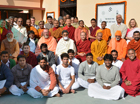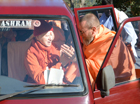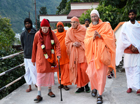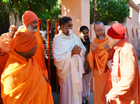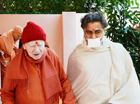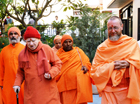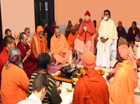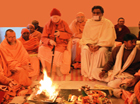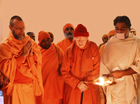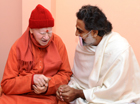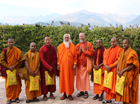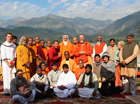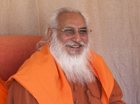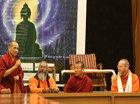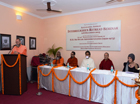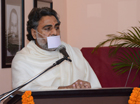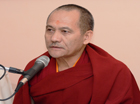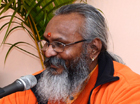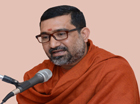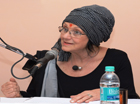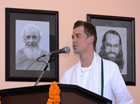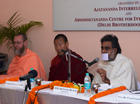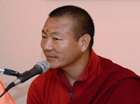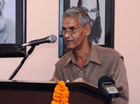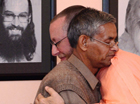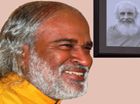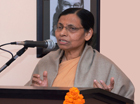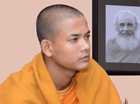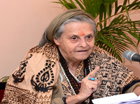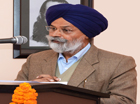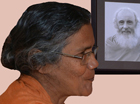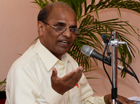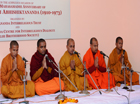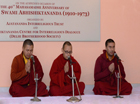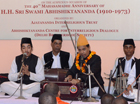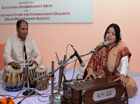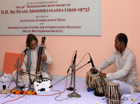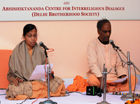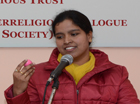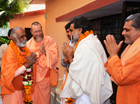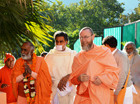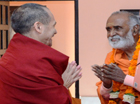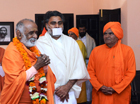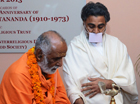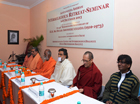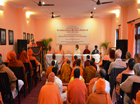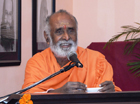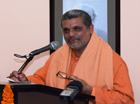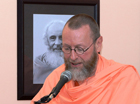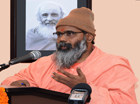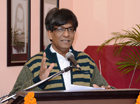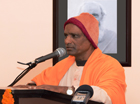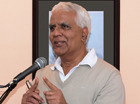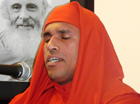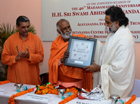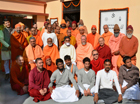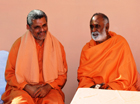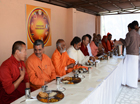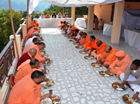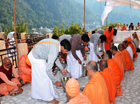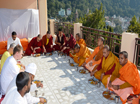A Commemoration of Sri Swami Abhishiktananda
The 40th Anniversary of Sri Swami Abhishiktananda's Mahasamadhi Celebration
at Ajatananda Ashram (Rishikesh, 6-8 December 2013)
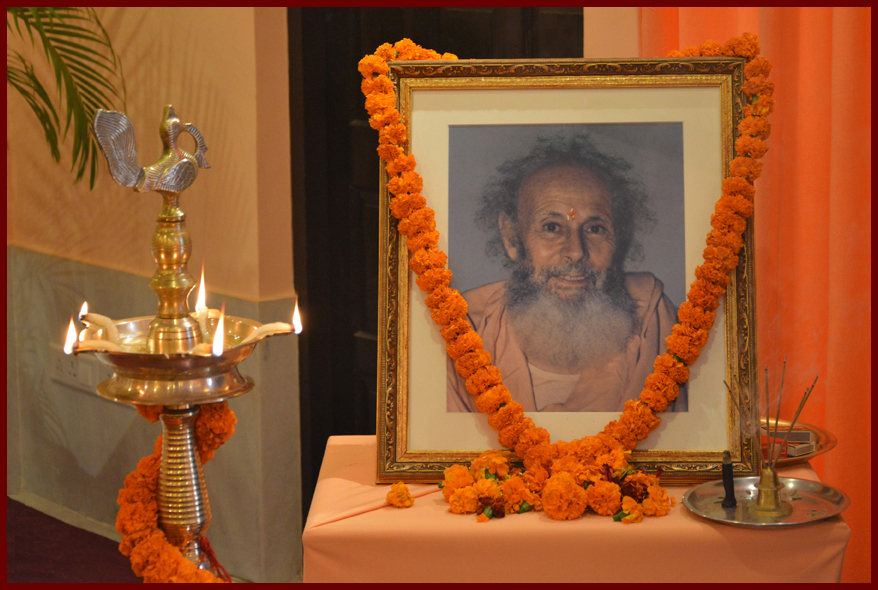
1. The Interreligious Retreat-Seminar Gallery
2. An Interreligious and Intermonastic Retreat-Seminar
on Swami Abhishiktananda: A Report
Swami Abhishiktananda, one of the most prominent spiritual figures of the twentieth century, arrived in India in 1948 as a Benedictine monk and spent the last twenty-five years of his life there. These years completely changed his spiritual vision and culminated in a profound awakening in July 1973. Despite his premature departure at the age of sixty-three, Swami Ji continues to inspire new generations of spiritual seekers even now after four decades. Therefore the fortieth anniversary of his Mahasamadhi became a most meaningful and auspicious opportunity to pay tribute to his pioneering work and message in the field of interreligious dialogue. From December 6 to 8, 2013, more than one hundred participants, among whom were eminent religious leaders of India, monks and nuns, and scholars belonging to different traditions, gathered in Rishikesh, at the Ajatananda Ashram [1], for a truly interreligious and intermonastic Retreat-Seminar.
This unique event was jointly organized by the Ajatananda Interreligious Trust and the Abhishiktananda Centre for Interreligious Dialogue (Delhi). It offered the participants an exceptional opportunity to discuss their views on the “The Place of Spiritual Experience in Interreligious Dialogue Today”, while spending several days living together as one community. For some of them it was an exceptional chance to share their vivid memories of Swami Ji. The convivial atmosphere of this gathering, enhanced by daily common prayers and silent meditation, shared meals and informal discussion, was actually a tremendous experience of unity beyond words.
Swami Atmananda Udasin, the convener of the Interreligious-Retreat-Seminar and Head Monk of Ajatananda Ashram as well as Director of the Abhishiktananda Centre, introduced the theme of the Seminar to the audience by focusing on the importance of spiritual experience in view of the legacy of Swami Abhishiktananda:
Swami Ji clearly realized that it was an impossible task to reconcile at the conceptual level his Christian theology and beliefs with the simple and yet profound Advaita of the Upanishads. This contradiction tormented him for years as he had already recognized the Truth of Advaita in the early 1950s. The advaitic experience, though not completed until July 1973, even became the reference point from which he tried to revisit his Christian background. However, his new hermeneutics was still within the limits of conceptualization and not satisfactory. The final resolution of his inner dilemma came with the overwhelming awakening experience (Atma sakshatkara) in Rishikesh, associated with his heart attack, on 14 July 1973. His ultimate experience was actually a trans-religious experience, beyond all religious formulations and, at the same time, comprising all of them. Therefore Swami Abhishiktananda stands today like a pioneer and a bridge–builder for all those who explore and foster the interreligious dialogue of spiritual experience and through spiritual experience. Though the academic and comparative approach is also very important, as religious traditions need to understand each other at the level of concepts, spiritual experience represents the deepest level of relationship between seekers and contemplatives of different traditions as Truth is one and transcends all philosophical concepts and religious differences. . . .
It was a privilege to have H.H. Sri Vivek Muni Ji as the Retreat-Seminar’s Chief Guest. A direct disciple and successor of H.H. Sri Sushil Kumar Muni Ji, one of the greatest Jain Acharyas of contemporary India and foremost figure in the field of interreligious dialogue, Sri Vivek Muni Ji left a great impression on the audience through his radiant presence and powerful words. He was extremely delighted to participate in this celebration of Swami Abhishiktananda’s life and unitive vision. In his address he underlined the importance of such qualities as ahimsa (non-violence), prema (pure love) and samanvaya (harmony) to foster cooperation between all religions of the world:
The fundamental values of any religion are peace, non-violence, love, compassion, friendliness, truthfulness and so on and so forth. . . . If all people in the world follow these precepts they will attain vishwa bandhutva [universal brotherhood], which means not only the unity of humankind, but also of all sentient beings. If we adopt at least one of these attributes, our life will be fulfilled. Bhagawan Mahavir [one of the main proponents of Jainism] said: “All living beings in the world are interrelated,” and “I don’t have any enemies in this created world.” In the same way in Hinduism and Vaidika Sanatana Dharma we come across the maxim “Vasudhaiva Kutumbakam” or “The whole world constitutes but a family.”
The Divine Life Society (Shivananda Ashram, Rishikesh) with whom Swami Abhishiktananda—as well as his principal disciple, Swami Ajatananda—was closely associated for almost a decade, was represented by its two spiritual heads: H.H. Swami Vimalananda, President, and H.H. Swami Padmanabhananda, General Secretary. Swami Vimalananda gave a first-hand testimony of his many meetings with Swami Abhishiktananda in the 1960s and 1970s. He was also the direct witness of the wonderful dialogue over the years between Swami Abhishiktananda and H.H. Swami Chidananda:
Beside meeting Swami Abhishiktananda Ji often at Shivananda Ashram, I also met him many times on the way to Rishikesh and once even in Gangotri. He was a very graceful person and at the same time a very simple monk. Amazingly, he fully adopted the Indian sadhu’s life style: in summer he used to wear only a very small lungi while being bare-chested. He never dressed himself for any aesthetic purpose, but his look was the expression of his authentic sannyasa.
Swami Padmanabhananda shared his views on the nature of spiritual experience. He drew the audience’s attention to the fact that spiritual experience transcends the concepts of the mind and therefore all philosophical representations of Truth:
There are conceptual barriers and, to go beyond these barriers, interreligious retreats are essential as spiritual experience is not actually a concept. Of course there is a need for certain theories, certain principles and dicta to understand it. Spirituality is first of all an experience. When someone has an experience, and wants to express that experience, naturally he has to use words. But, as the Upanisads declare, spiritual experience passes all words as it is beyond the concepts of the mind. It transcends words. The mind cannot reach the spiritual experience, it is not within the ambit of the mind. It can never be a mental experience.
The Rev. Dr. Monodeep Daniel, BAC, Secretary of the Delhi Brotherhood Society, who personally knew Swami Abhishiktananda—as Swami Ji often stayed at his home in Bareilly in the 1960s—gave a very interesting testimony on the practical interreligious and intrareligious dialogue in the life of Swami Ji.
The Buddhist community was represented by monks of different traditions and schools: Ven. Dr. Tashi Samphel, Professor at the Central University of Tibetan Studies (Sarnath, Varanasi) and Director of the Songtsen Library (Dehradun), Ven. Khenpo Ngawang Woser, Professor at the Deer Park Institute (Bir, Himachal Pradesh) as well as by two groups of Venerable monks belonging to Theravada and Vajrayana (Drikung) traditions who beautifully performed contemplative chanting of the Holy Sutras at different moments of the event.
A significant contribution was made by scholars both from India and abroad among whom there were: Professor Tikam Chand Jain, Head of the Centre for Jain Studies at the Teerthanker Mahaveer University (Moradabad, Uttar Pradesh); Dr. (Mrs.) Milena Carrara, President of the Raimon Panikkar Vivarium Foundation (Tavertet, Spain); and Dr. (Mrs.) Uma Marina Vesci, a close friend of Swami Abhishiktananda, an Indologist and Historian of Religions (Delhi).
Participants of the Retreat-Seminar were especially moved by the testimony of Sri Lalit Sharma who was one of the first Indian disciples of Swami Abhishiktananda. He met Swami Ji for the first time in Dehradun (North India) in November 1966 at the young age of eighteeen and gradually developed a genuine guru-disciple relationship with him. Lalit Ji cherished a deep spiritual intimacy with Swami Ji for over almost seven years and acknowledges him as the spiritual master who changed his life. His words came directly from the heart:
I met Swami Ji for the first time in my friend’s house in Dehradun. There were no plans to meet him and it was a truly divine coincidence. I was very impressed. His darshan was so powerful. I felt like living with him forever and so asked him straight away, “Can I stay with you?” He told me that I could join him after my graduation from school as I was still very young at that time. It was in 1966 that I sent a letter to Swami Ji and asked him if it would be possible to spend my summer holidays with him in his kutiya in Gyansu, Uttarkashi. Swami Ji welcomed me, and that summer we stayed together for about three weeks. It was my first experience with him. Thereafter I would spend all my college holidays in Gyansu… Swami Ji used to inform me about his whereabouts and so I would also meet him at my family house while he was on his way to Delhi. I was with him many times in Delhi and Haridwar as well. For me Swami Ji has always been a source of pure light and a great Guru. Actually, Swami Abhishiktananda—Sri Lalit Sharma pointed out in conclusion—was much more than what I shared. He was wisdom and love incarnated. . . .
Sri Swami Prem Vivekananda Udasin (Secretary, Sadhana Kendra Ashram, Dehradun, Uttarakhand) delivered the message and blessing of H.H. Sri Chandra Swami Ji Udasin who emphasized that:
The true purpose of religion is to unite the soul with its Source, which is God. It is natural that there have to be differences in the rituals, philosophies and doctrines of different religions. Just as the different colours and fragrances of various flowers add beauty and charm to a garden, similarly the different paths leading to the ultimate spiritual Summit, each have their own unique beauty. However, at the level of the spirit, the Atman, these differences disappear. The Spirit is infinite and eternal. There cannot be two infinities; therefore the highest spirituality is the same in all religions, and indeed is the essential part of every religion. From the spiritual viewpoint, all living beings are one. It is through true spiritual experience that one realizes directly this unity in diversity. Differences exist only at the level of the mind. One who transcends the mind,experiences first-hand the eternal Bliss-Consciousness that is omnipresent, present in all things and all living beings. Such a one transcends all limitations; all religions are his own, and yet he is not bound to any religion. He or she perceives clearly that all the different paths, if followed with sincerity, purity of intention and deep aspiration to discover the Truth, lead to the Divine, the timeless, infinite Consciousness. . . . Lastly Sri Swami Ji blessed all the participants and invited them to ascend to the highest summit of spirituality, the experience of oneness, which transcends all differences.
The Ven. Khenpo Ngawang Woser communicated to the audience the message of H.E. Dzongsar Jamyang Khyentse Rinpoche, one of the leading present-day Tibetan Buddhist masters, who highlighted the importance of interreligious dialogue and cooperation in this age of rampant global materialism. According to him,
The gathering of spiritual energy in which you are engaged, especially in such a sacred place as Rishikesh on the banks of the holy Ganges, is more important than ever. Indeed, it might be said that nothing else but such determined summoning of sanity and wisdom will suffice to ameliorate and hopefully to reverse the tide of ego-centered greed, aggression, and ignorance that is literally destroying our sacred world. None of us can do that alone, so your joining of spiritual forces on this auspicious occasion is precisely what is needed to chart a sane course for the future.
Among other speakers there were: Sri Swami Aruljyothi Ananda, OCD (Jeevan Jyoti Ashram, Tamil Nadu); Sri Swami Atmananda Tirtha (Samanvaya Tirtham, Kerala); Sri Darshan Singh (General Manager, Gurdwara Sri Hemkunt Sahib, Rishikesh, Uttarakhand); Rev. Fr. Korko Moses, SJ (Dhyana Vanam Ashram, Tamil Nadu); Rev. Sister Jaya, SSA (Vardan Ashram, Uttarakhand); Sri Mansoor Abdullah (Delhi); Sri Swami Muktananda Yati (One World School of Vedanta, Kerala); Rev. Sister Paula, SRA (Nitya Chaitanya Vihara, Sarnath, Uttar Pradesh); Sri Swami Radhagiridhar (Sri Sri Radha Ma Ashram, Tiruvannamalai, Tamil Nadu); Sri Swami Tanmayananda (Sri Sri Ma Anandamayee Ashram, Dehradun, Uttarakhand); Sri Swami Anandavesh (Arya Samaj, Gurukul Sanskrit Mahavidyalaya, Shukratal, Uttar Pradesh), Sri Swami Tirthananda Udasin (Rishikesh, Uttarakhand); and Dr. Maxim Demchenko (Moscow, Russia).
Beside all these touching and inspiring sharings, greetings and blessings were received from: H.H. Swami Nityananda Giri (Sri Gnanananda Niketan, Tirukoyilur, Tamil Nadu); H.H. Baba Shivarudra Balyogi (Dehradun, Uttarakhand); Ven. Geshe Lhakdor (Dharamshala, Himachal Pradesh); Hazrat Inam Hasan Gudri Shah Baba V (Ajmer, Rajasthan); and Pir Ibrahim Abdurrahman Farajajé (Berkley/Istanbul).
The Interreligious Retreat-Seminar was also marked by a memorable visit of its participants to Sadhana Kendra Ashram, the residence of H.H. Sri Chandra Swami Udasin, which is located at the Himalayan foothills and on the banks of the holy Yamuna river. The trip—which took place on the first day of the event—was a rare opportunity for teachers and seekers from different traditions to sit in silence together at the feet of a realized Sage who also personally knew Swami Abhishiktananda, and who holds him in great esteem. The satsang with H.H. Sri Chandra Swami was followed by a short but memorable pilgrimage to the Sri Sri Ma Anandamayee Ashram in Dehradun where she attained Mahasamadhi in 1982. Sri Sri Ma Anandamayee was a highly realized female-sage who always emphasized in her teachings the unique essence of all religions: “I am a Hindu, I am a Muslim, I am a Christian. . . .”, as she used to say. A special reception was also organized at the Centre for Tibetan and Himalayan Studies (Songtsen Library), one of the renowned places of learning of Tibetan Buddhism in North India.
The celebration of the date of the Mahasamadhi, December 7, was opened in the early hours with a havan ceremony presided over by H.H. Swami Vimalananda Saraswati and officiated by Hindu pandits from Rishikesh who graciously invited monks of different religious traditions to participate and even chant their Scriptures. In the evening, an interreligious music concert was held and created such a profound atmosphere of unity and brotherhood that it truly became one of the highlights of the Retreat-Seminar. Several monks from neighbouring ashrams as well as many villagers took part in this marvelous event. Indeed, music is a unique sign to convey the spirit of oneness beyond concepts. For more than three hours, musicians—representing Hindu, Sufi, Sikh, Buddhist and Christian communities— performed with exceptional enthusiasm and talent bhajans, shabads, qawwalis, sutras, hymns and other religious compositions. The performance of the Sufi master Ustad Abdul Hameed Sabri was especially amazing and reached out to the “soul” of the audience.
The three-day program ended with bhandara, a festive meal offered to hundreds of monks, nuns and participants, as well as ashramites of Rishikesh and the entire village of Tapovan. All experienced the spirit of oneness irrespective of religious and cultural background, and felt the warm welcome of the organizing team—and of course, the living presence of Swami Abhishiktananda whose spiritual journey and outstanding contribution to the dialogue of unity were duly and splendidly commemorated at the event.
*This Report authored by Dr. Maxim Demchenko was first published online in Dilatato Corde, Vol. IV, No. 2, July-December 2014 (http://www.dimmid.org), and is reproduced here with the kind permission of the General Secretary, DIMMID.
[1] Ajatananda Ashram is an interreligious monastic ashram on the Ganges, in Rishikesh (North India). The ashram is inspired by the vision of Swami Abhishktananda and his principal disciple, Swami Ajatananda (Marc Chaduc). Website: www.ajatananda.org

